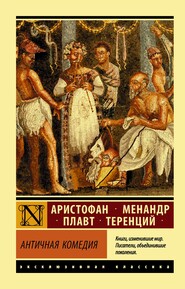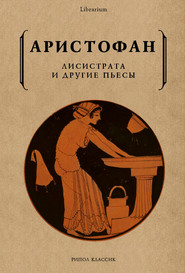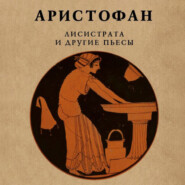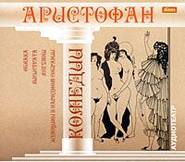По всем вопросам обращайтесь на: info@litportal.ru
(©) 2003-2024.
✖
The Eleven Comedies, Volume 1
Автор
Год написания книги
2018
Настройки чтения
Размер шрифта
Высота строк
Поля
JUST DISCOURSE. I am looking at them.
UNJUST DISCOURSE. Well! What do you see?
JUST DISCOURSE. By the gods, they are nearly all low scum. See, this one I know to be such and that one and that other with the long hair.
UNJUST DISCOURSE. What have you to say, then?
JUST DISCOURSE. I am beaten. Debauchees! in the name of the gods, receive my cloak;[565 - Having said this, Just Discourse threw his cloak into the amphitheatre and took a seat with the spectators.] I pass over to your ranks.
SOCRATES. Well then! do you take away your son or do you wish me to teach him how to speak?
STREPSIADES. Teach him, chastise him and do not fail to sharpen his tongue well, on one side for petty law-suits and on the other for important cases.
SOCRATES. Make yourself easy, I shall return to you an accomplished sophist.
PHIDIPPIDES. Very pale then and thoroughly hang-dog-looking.
STREPSIADES. Take him with you.
PHIDIPPIDES. I do assure you, you will repent it.
CHORUS. Judges, we are all about to tell you what you will gain by awarding us the crown as equity requires of you. In spring, when you wish to give your fields the first dressing, we will rain upon you first; the others shall wait. Then we will watch over your corn and over your vine-stocks; they will have no excess to fear, neither of heat nor of wet. But if a mortal dares to insult the goddesses of the Clouds, let him think of the ills we shall pour upon him. For him neither wine nor any harvest at all! Our terrible slings will mow down his young olive plants and his vines. If he is making bricks, it will rain, and our round hailstones will break the tiles of his roof. If he himself marries or any of his relations or friends, we shall cause rain to fall the whole night long. Verily, he would prefer to live in Egypt[566 - Because it never rains there; for all other reasons residence in Egypt was looked upon as undesirable.] than to have given this iniquitous verdict.
STREPSIADES. Another four, three, two days, then the eve, then the day, the fatal day of payment! I tremble, I quake, I shudder, for 'tis the day of the old moon and the new.[567 - That is, the last day of the month.] Then all my creditors take the oath, pay their deposits,[568 - By Athenian law, if anyone summoned another to appear before the Courts, he was obliged to deposit a sum sufficient to cover the costs of procedure.] swear my downfall and my ruin. As for me, I beseech them to be reasonable, to be just, "My friend, do not demand this sum, wait a little for this other and give me time for this third one." Then they will pretend that at this rate they will never be repaid, will accuse me of bad faith and will threaten me with the law. Well then, let them sue me! I care nothing for that, if only Phidippides has learnt to speak fluently. I go to find out, let me knock at the door of the school…. Ho! slave, slave!
SOCRATES. Welcome! Strepsiades!
STREPSIADES. Welcome! Socrates! But first take this sack (offers him a sack of flour); it is right to reward the master with some present. And my son, whom you took off lately, has he learnt this famous reasoning, tell me.
SOCRATES. He has learnt it.
STREPSIADES. What a good thing! Oh! thou divine Knavery!
SOCRATES. You will win just as many causes as you choose.
STREPSIADES. Even if I have borrowed before witnesses?
SOCRATES. So much the better, even if there are a thousand of 'em!
STREPSIADES. Then I am going to shout with all my might. "Woe to the usurers, woe to their capital and their interest and their compound interest! You shall play me no more bad turns. My son is being taught there, his tongue is being sharpened into a double-edged weapon; he is my defender, the saviour of my house, the ruin of my foes! His poor father was crushed down with misfortune and he delivers him." Go and call him to me quickly. Oh! my child! my dear little one! run forward to your father's voice!
SOCRATES. Here he is.
STREPSIADES. Oh, my friend, my dearest friend!
SOCRATES. Take your son, and get you gone.
STREPSIADES. Oh, my son! oh! oh! what a pleasure to see your pallor! You are ready first to deny and then to contradict; 'tis as clear as noon. What a child of your country you are! How your lips quiver with the famous, "What have you to say now?" How well you know, I am certain, to put on the look of a victim, when it is you who are making both victims and dupes! and what a truly Attic glance! Come, 'tis for you to save me, seeing it is you who have ruined me.
PHIDIPPIDES. What is it you fear then?
STREPSIADES. The day of the old and the new.
PHIDIPPIDES. Is there then a day of the old and the new?
STREPSIADES. The day on which they threaten to pay deposit against me.
PHIDIPPIDES. Then so much the worse for those who have deposited! for 'tis not possible for one day to be two.
STREPSIADES. What?
PHIDIPPIDES. Why, undoubtedly, unless a woman can be both old and young at the same time.
STREPSIADES. But so runs the law.
PHIDIPPIDES. I think the meaning of the law is quite misunderstood.
STREPSIADES. What does it mean?
PHIDIPPIDES. Old Solon loved the people.
STREPSIADES. What has that to do with the old day and the new?
PHIDIPPIDES. He has fixed two days for the summons, the last day of the old moon and the first day of the new; but the deposits must only be paid on the first day of the new moon.
STREPSIADES. And why did he also name the last day of the old?
PHIDIPPIDES. So, my dear sir, that the debtors, being there the day before, might free themselves by mutual agreement, or that else, if not, the creditor might begin his action on the morning of the new moon.
STREPSIADES. Why then do the magistrates have the deposits paid on the last of the month and not the next day?
PHIDIPPIDES. I think they do as the gluttons do, who are the first to pounce upon the dishes. Being eager to carry off these deposits, they have them paid in a day too soon.
STREPSIADES. Splendid! Ah! poor brutes,[569 - He points to an earthenware sphere, placed at the entrance of Socrates' dwelling, and which was intended to represent the Whirlwind, the deity of the philosophers. This sphere took the place of the column which the Athenians generally dedicated to Apollo, and which stood in the vestibule of their houses.] who serve for food to us clever folk! You are only down here to swell the number, true blockheads, sheep for shearing, heap of empty pots! Hence I will sound the note of victory for my son and myself. "Oh! happy, Strepsiades! what cleverness is thine! and what a son thou hast here!" Thus my friends and my neighbours will say, jealous at seeing me gain all my suits. But come in, I wish to regale you first.
PASIAS (to his witness). A man should never lend a single obolus. 'Twould be better to put on a brazen face at the outset than to get entangled in such matters. I want to see my money again and I bring you here to-day to attest the loan. I am going to make a foe of a neighbour; but, as long as I live, I do not wish my country to have to blush for me. Come, I am going to summon Strepsiades.
STREPSIADES. Who is this?
PASIAS. … for the old day and the new.
STREPSIADES. I call you to witness, that he has named two days. What do you want of me?
PASIAS. I claim of you the twelve minae, which you borrowed from me to buy the dapple-grey horse.
STREPSIADES. A horse! do you hear him? I, who detest horses, as is well known.
PASIAS. I call Zeus to witness, that you swore by the gods to return them to me.











